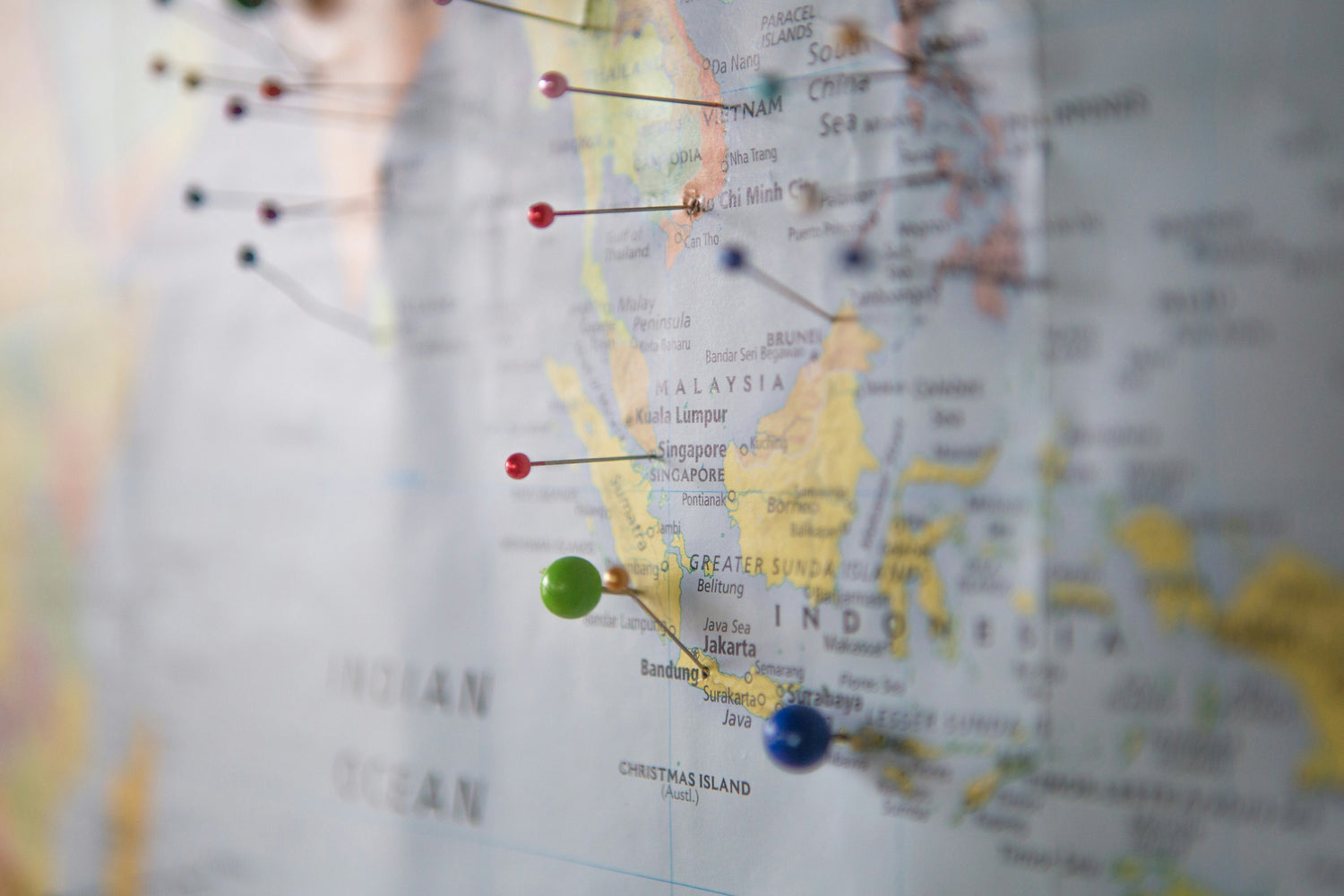The pursuit of longevity and health often feels like a never-ending quest. there are too many people with their takes and opinions, never-ending research studies, conflicting opinions and a lot of fads that ends up keeping us informationally constipated. However, there are regions on our planet known as "Blue Zones" where people effortlessly live longer, healthier lives.
These Blue Zones are pockets of the world where people reach age 100 at rates 10 to even 20 times greater than in the United States. Think about this what does this say for the Western and American diet if those numbers are easily reached in other areas of the world?
Understanding the lifestyles and habits of these centenarians provides valuable insights into how we might enhance our health and longevity and even remove some bad habits that we have normalised over the generations as we have slowly incorporated the poisonous things that the supposed health industry and food industry encourage us to consume. Now I'm not all for conspiracy theories on every topic ever but it has to make you think. If we are encouraged to eat said food that results in us needing more medical care and rise in obesity/ mortality and also a decrease in life expectancy, what does that say about the integrity of these government and big corporate bodies?
Just some food for thought! But hey let's jump into the good stuff.
What Are Blue Zones?
Blue Zones are regions identified by National Geographic Fellow Dan Buettner and his team of researchers, where people live the longest and healthiest lives. The five Blue Zones are unique for their high concentration of centenarians. Let’s delve into the scientific studies, research, and data behind each Blue Zone and the specific practices that contribute to their residents’ remarkable lifespans.
These areas are:
- Okinawa, Japan: Home to the world's oldest women.
- Sardinia, Italy: Where men live the longest, particularly in the island's mountainous regions.
- Nicoya Peninsula, Costa Rica: Known for its low rates of middle-age mortality and higher likelihood of reaching a healthy old age.
- Ikaria, Greece: An island with one of the lowest rates of middle-age mortality and dementia.
- Loma Linda, California, USA: A community with a significant population of Seventh-day Adventists who live 10 years longer than their North American counterparts.
Applying Blue Zone Principles
While we may not all live in Blue Zones, we can certainly adopt their principles to improve our own longevity and health:
- Incorporate Natural Movement: Find ways to move naturally throughout the day. Take the stairs, walk more, and engage in activities that require physical effort.
- Find Your Purpose: Reflect on what brings you joy and meaning. Pursue activities and goals that give your life purpose.
- Reduce Stress: Develop routines to manage stress. This could be through meditation, spending time with loved ones, or engaging in hobbies.
- Eat Wisely: Focus on a plant-based diet and practice mindful eating by stopping when you feel 80% full.
- Connect: Build and maintain strong social networks. Prioritise relationships and community involvement.
These time-tested habits are a testament to how humans across the world have figured out what a good quality of life is and means. We can enhance our well-being and potentially increase our lifespan, much like the remarkable centenarians in the Blue Zones if we look to implement and follow some of the principles these blue zoners do. These regions teach us that longevity is not just about living longer, but living better—healthier, happier, and more connected lives.
The Power Nine: Evidence-Based Secrets of Longevity
Buettner’s research identified nine common lifestyle habits shared by Blue Zone inhabitants, known as the "Power Nine." Each principle is supported by scientific studies and data, illustrating their impact on health and longevity. Here we will go through each one, running through the zones that implement these principles backed by science studies and what it means.
1. Move Naturally
In Blue Zones, physical activity is an integral part of daily life, embedded into the fabric of routine activities rather than through structured exercise. they engage in natural movement through gardening, walking, and manual tasks.
- Okinawa: Residents engage in regular gardening and traditional martial arts like Tai Chi, which naturally results in increased flexibility and strength.
- Sardinia: Shepherding on the island’s steep terrain requires constant movement, enhancing cardiovascular health.
Scientific Evidence: A study published in the British Journal of Sports Medicine found that non-exercise physical activity, such as walking and gardening, is associated with a lower risk of cardiovascular disease and mortality.
What does this mean? Well for 1 this doesn't mean you shouldn't continue exercising with a structured workout plan as there is evidence that shows the benefits for doing that and can definitely enhance your overall health and happiness but its not a necessity. Will weight training and increasing your protein mean strong muscles and higher bone density and overall strength? Yes, but that doesn't mean you still won't live a long and well-abled life- so just make sure that it is balanced and is something you can maintain throughout the years
2. Purpose
A strong sense of purpose, known as "ikigai" in Okinawa and "plan de vida" in Nicoya, contributes to longevity.
- Okinawa: Elderly individuals maintain a sense of purpose through social roles and community activities.
- Nicoya: Residents often work in meaningful occupations well into old age.
Scientific Evidence: Research published in Psychological Science indicates that having a sense of purpose can extend life expectancy by up to seven years.
If it wasn't clear by now then this definitely shows… You have to have a purpose, it is important that every human being has their own purpose no matter what it is and if its within a community even better! The evidence is there and the proof is in the pudding. We are social animals we need a role and a sense of belonging in order to thrive and maintain good health. Make sure you understand and discover your purpose and even better make it so that it impacts other people.
3. Downshift
Chronic stress leads to inflammation, linked to age-related diseases. Blue Zone inhabitants have effective stress-relief practices.
- Ikaria: Napping and socialising help residents unwind.
- Sardinia: Daily happy hours and social gatherings reduce stress.
Scientific Evidence: A study in the Journal of Clinical Endocrinology & Metabolism found that chronic stress is associated with shorter telomeres, which are linked to ageing and early death.
Whether it is chronic or not stress is a powerful toxin, in some circumstances stress is great as it enhances a person's ability to overcome and that uncomfortableness forces them to grow, but a prolonged period of stress and or a major overwhelming stress period or event can significantly impact the body in numerous ways, from greying hairs to speeding up the process of ageing, including mental not just physical. It's important that we minimise the stress that can trigger long-term health effects and aim to have fun and include protocols that allow you to destress or prevent stress from building up and becoming an issue. Some of these blue zoners have routines to shed stress, such as prayer, napping, or spending time with loved ones. Guys it's not just about detoxifying the body it's also about the mind too.
4. 80% Rule
People in Blue Zones tend to stop eating when they are 80% full, a practice known as "Hara Hachi Bu" in Okinawa.
- Okinawa: This cultural habit prevents overeating and helps maintain a healthy weight.
- Ikaria: Similar practices of portion control are observed.
Scientific Evidence: Research in the American Journal of Clinical Nutrition shows that calorie restriction can slow ageing and improve metabolic health .
I know some of you, including me love food, in fact maybe bulking or exercising alot gives you the ability to eat more and so you consume a large capacity of food however be mindful that that is not necessarily what the body needs or wants, maybe the muscles want extra food but the gut, and the digestive system might not agree. It's something to think about for sure as anti-inflammation protocols will help you from ageing faster, not to mention prevent diseases and issues to do with your digestive system that has to work overtime constantly.
5. Living with the Land
Diets in Blue Zones are high in plant-based foods, rich in vegetables, legumes, and whole grains. And consume meats as well.
- Loma Linda: The Adventist community follows a vegetarian diet.
- Ikaria: The Mediterranean diet, rich in beans and greens, is prevalent.In addition to lamb, pork and chicken
Scientific Evidence study published in JAMA Internal Medicine found that reducing processed meat intake and opting for higher quality, unprocessed meats, which are often organic, is associated with a lower risk of mortality.
Living off the land and using the resources around you is the healthiest way to live, eating foods grown in your garden and animals that graze the land and eating a healthy natural diet will allow you to consume nutrient-dense foods that are packed full of good stuff, we are what we eat so if we eat GMO foods and animals that have a bad diet we too will end up feeling the effects within our foods as everything gets more concentrated at the top.
6. Wine at 5
Moderate alcohol consumption, particularly wine, is common in many Blue Zones and is often enjoyed with friends and family.
- Sardinia: Cannonau wine, rich in antioxidants, is a staple.
- Ikaria: Daily wine consumption during meals is the norm.
Scientific Evidence: Moderate wine consumption has been linked to increased longevity in studies such as the one published in Nature.
Let's break this one down a little further. Wine, particularly red wine, contains antioxidants that contribute to its health benefits, primarily due to compounds derived from the fruit itself rather than the fermentation process. The most notable antioxidants in wine are polyphenols, including resveratrol, which are found in the skins and seeds of grapes. So whether you choose to drink wine or not the key takeaway is eating fruit such as grapes or consuming it through wine, will allow you to gain the benefits of longevity.
7. Belong
Faith and community involvement are crucial in Blue Zones, providing social support and a sense of belonging.
- Loma Linda: Regular participation in faith-based activities is common.
- Sardinia: Strong familial and community ties are integral.
Scientific Evidence: A study in PLOS Medicine found that regular participation in religious activities is associated with lower mortality rates.
It's not just this though, it's the fact that the community is huge and everyone has a place and belonging, as mentioned before we are social creatures who need one another. As much as the modern world likes to portray otherwise, no matter if you are introverted or extroverted by nature we all need a purpose, community and family to make us fell fulfilled and loved. Moreover being in a community that has harmony between morals outlooks and viewpoints gives everyone a feeling of safety and support
8. Loved Ones First
Family is a priority in Blue Zones. Elderly family members are cared for and revered, which provides emotional support and purpose.
- Nicoya: Intergenerational living is common, with elders living with their children and grandchildren.
- Sardinia: Elderly family members play active roles in family life.
Scientific Evidence: Research in Social Science & Medicine indicates that strong family support networks contribute to better health and longevity.
Think about this, Family is your legacy it's your blood and a line of lineage it's where you can rely on others to help you and where you feel most at ease and wanted. With family they make sure that they function well and look after each other, if someone is ill they are looked after and if someone is struggling they are fed, this strong sense of family allows everyone to feel supported, looked after and never left alone.
9. Right Tribe
Social networks that promote healthy behaviours are a common feature in Blue Zones.
- Okinawa: “Moai” groups (social support networks) encourage healthy lifestyles.
- Loma Linda: Social circles within the Adventist community promote healthful behaviours.
Scientific Evidence: A study published in The American Journal of Public Health found that social networks significantly influence health behaviours and outcomes.
A band of brothers is important in fact it's integral to check out more about men and the vital need for connection and brotherhood check out this blog. But to put it simply these blue zones ensure that they have close networks that they can do activities and share with whether its women with women and men with men they have a well-balanced ecosystem.
Insights from Each Blue Zone
Okinawa, Japan
Okinawa has the highest number of centenarians in the world. The Okinawan diet is low in calories and high in vegetables and tofu. The practice of "Hara Hachi Bu" helps prevent overeating. Regular physical activity, like gardening and traditional martial arts, is part of daily life. Okinawans also maintain strong social networks through "Moai" groups.
Sardinia, Italy
In Sardinia, particularly in the mountainous regions, men tend to live exceptionally long lives. A key factor is the traditional shepherd lifestyle, which involves constant walking and physical labour. The Sardinian diet includes whole grains, vegetables, and moderate amounts of wine. Social and family bonds are incredibly strong, with elders playing vital roles in the community.
Nicoya Peninsula, Costa Rica
Nicoya boasts a diet rich in beans, corn, and squash. Residents maintain strong family bonds and have a clear sense of purpose. They engage in physical labour throughout their lives and consume water high in calcium and magnesium, which may contribute to their longevity.
Ikaria, Greece
Ikaria is known for its Mediterranean diet, which includes olive oil, vegetables, breads, meats, and moderate wine consumption. The island has a culture of socialising and daily naps, which help reduce stress. Ikarians also practice regular physical activity through gardening and walking.
Loma Linda, California, USA
Loma Linda is unique due to its significant population of Seventh-day Adventists who live, on average, 10 years longer than their North American counterparts. The Adventist diet is plant-based, and the community places a strong emphasis on faith, family, and healthful living practices. Although there are still some in the community who eat meat within their diets.
Conclusion
The Blue Zones offer valuable lessons on how to live longer, healthier lives.
The people who live longest on this earth aren't vegan, they aren't carnivores and they don't even go to the gym - some eat alot of pasta, rice, cheese and bread
Sardinia is one of the blue zones that live the longest they have the highest concentration of men over 100 and more than 20 times the number of centenarians than other populations similar in the US
Their diet consists of everything, pasta, cheese, meat such as pig and lamb, greens such as asparagus and celery
The difference is that almost all their food is locally grown in gardens or from local farmers eating little to no sugar or processed foods/ preservatives
They may not go to the gym but they are very active into old age moving naturally - attending gardens, walking to the markets and town, strolling around the countryside and most importantly spending time with family and friends getting the much-needed social interaction whilst fulfilling their purpose in their community and managing stress as to live a more peaceful life. They even drink in moderation.
This is in stark contrast to a lifestyle centred around money that brings on work and stress instead of positivity, family and community. The type of lifestyle that strives for fostering a lack of purpose isolationism and a need to optimise in pursuit of happiness and health and yet people still seem to not be happy and fulfilled and live shorter lives.
Maybe its not so much about optimal processes and the most nutrient-dense diet and best exercise regime for longevity but rather about the simple things and from there adding the processes that work best for you that aid in health, nutrition and happiness. Don't forget we are animals we weren't made in a lab and weren't made to be machines - we have the answers within ourselves and the natural environment The blue zones should be looked at for possible blueprints for health and longevity however ultimately as long as you ask yourself the right questions and are truly honest with the answers then only you can determine what works for you and your health in all aspects.
Thanks for reading,
Bradley D.R
Co-director of KINGS PIECE





